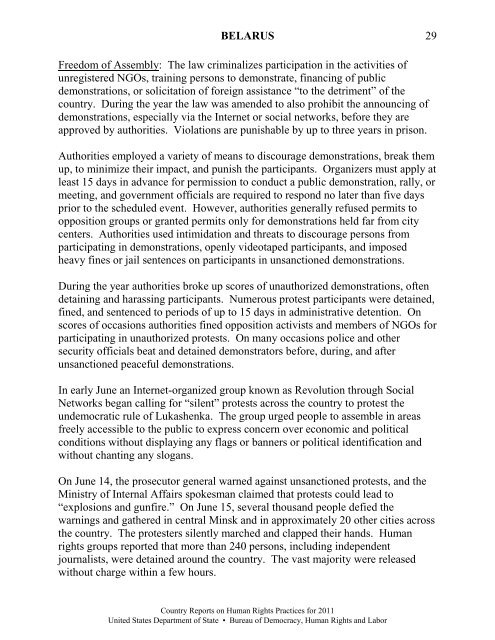belarus executive summary - US Department of State
belarus executive summary - US Department of State
belarus executive summary - US Department of State
Create successful ePaper yourself
Turn your PDF publications into a flip-book with our unique Google optimized e-Paper software.
BELAR<strong>US</strong> 29<br />
Freedom <strong>of</strong> Assembly: The law criminalizes participation in the activities <strong>of</strong><br />
unregistered NGOs, training persons to demonstrate, financing <strong>of</strong> public<br />
demonstrations, or solicitation <strong>of</strong> foreign assistance “to the detriment” <strong>of</strong> the<br />
country. During the year the law was amended to also prohibit the announcing <strong>of</strong><br />
demonstrations, especially via the Internet or social networks, before they are<br />
approved by authorities. Violations are punishable by up to three years in prison.<br />
Authorities employed a variety <strong>of</strong> means to discourage demonstrations, break them<br />
up, to minimize their impact, and punish the participants. Organizers must apply at<br />
least 15 days in advance for permission to conduct a public demonstration, rally, or<br />
meeting, and government <strong>of</strong>ficials are required to respond no later than five days<br />
prior to the scheduled event. However, authorities generally refused permits to<br />
opposition groups or granted permits only for demonstrations held far from city<br />
centers. Authorities used intimidation and threats to discourage persons from<br />
participating in demonstrations, openly videotaped participants, and imposed<br />
heavy fines or jail sentences on participants in unsanctioned demonstrations.<br />
During the year authorities broke up scores <strong>of</strong> unauthorized demonstrations, <strong>of</strong>ten<br />
detaining and harassing participants. Numerous protest participants were detained,<br />
fined, and sentenced to periods <strong>of</strong> up to 15 days in administrative detention. On<br />
scores <strong>of</strong> occasions authorities fined opposition activists and members <strong>of</strong> NGOs for<br />
participating in unauthorized protests. On many occasions police and other<br />
security <strong>of</strong>ficials beat and detained demonstrators before, during, and after<br />
unsanctioned peaceful demonstrations.<br />
In early June an Internet-organized group known as Revolution through Social<br />
Networks began calling for “silent” protests across the country to protest the<br />
undemocratic rule <strong>of</strong> Lukashenka. The group urged people to assemble in areas<br />
freely accessible to the public to express concern over economic and political<br />
conditions without displaying any flags or banners or political identification and<br />
without chanting any slogans.<br />
On June 14, the prosecutor general warned against unsanctioned protests, and the<br />
Ministry <strong>of</strong> Internal Affairs spokesman claimed that protests could lead to<br />
“explosions and gunfire.” On June 15, several thousand people defied the<br />
warnings and gathered in central Minsk and in approximately 20 other cities across<br />
the country. The protesters silently marched and clapped their hands. Human<br />
rights groups reported that more than 240 persons, including independent<br />
journalists, were detained around the country. The vast majority were released<br />
without charge within a few hours.<br />
Country Reports on Human Rights Practices for 2011<br />
United <strong>State</strong>s <strong>Department</strong> <strong>of</strong> <strong>State</strong> • Bureau <strong>of</strong> Democracy, Human Rights and Labor
















